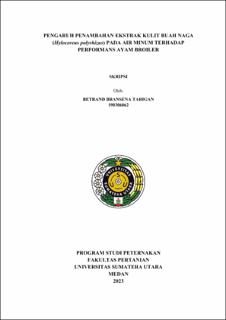Pengaruh Penambahan Ekstrak Kulit Buah Naga (Hylocereus polyrhizus) pada Air Minum terhadap Performans Ayam Broiler
The Effect of Adding Dragon Fruit Peel Extract (Hylocereus polyrhizus) to Drinking Water on the Performance of Broiler Chickens

Date
2023Author
Tarigan, Betrand Bransena
Advisor(s)
Hanafi, Nevy Diana
Ketaren, Nurjama'yah Br
Metadata
Show full item recordAbstract
Broiler chicken (Gallus domesticus) is one of the warm-blooded animals that
does not have complete sweat glands on its body and is susceptible to environmental
temperature heat stress. The resulting impact is that chickens are easily stressed and
can trigger free radicals. Giving additives in the form of antioxidants is one of the
efforts that can be made to overcome oxidative stress due to high environmental
temperature stress. Antioxidants are compounds that can inhibit the oxidation reaction
process in the body by replacing ions and neutralizing free radicals to become more
stable. To overcome this, there is an interest in using natural ingredients from natural
resources as antioxidants in broiler chickens. Dragon fruit peel (Hylocereus
polyrhizus) is known as part of fruits that have high antioxidant effectiveness
compared to the pulp.
The effect of the addition of Dragon Fruit Peel Extract as a natural antioxidant
will be observed in broiler performance which includes feed consumption, body weight
gain and feed conversion. Maintenance is differentiated based on starter and finisher
phases and maintained for 35 days. The treatments used in the study were dragon fruit
peel extract with various concentrations, namely P0 (0%), P1 (7.5%), P2 (15%) and
P3 (22.5%) added to the broiler drinking water. Observations of performance results
were observed using the Complete Randomized Design (CRD) method and further
tested using the 5% Duncant Test. Based on the results showed that the treatment of
extracts using P1 (7.5%) concentration produced the best average results, namely feed
consumption (89.68 ± 1.214), body weight gain (51.09 ± 0.85) and feed conversion
(1.755 ± 0.04).
Collections
- Undergraduate Theses [841]
